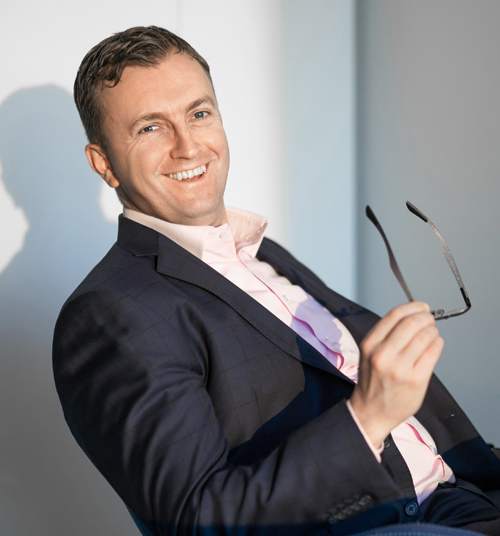The Outstanding Contribution to Real Estate: Robert Dobrzycki of Panattoni
A company can be well-organised but still enterprising… “and if we became a corporation, I’d quit,” declares Robert Dobrzycki, the head of Panattoni Europe and the recipient of the Eurobuild Award for Outstanding Contribution to the Real Estate Market. In his time at the helm of the company he has built a warehouse giant almost from scratch, but it seems that this has only sharpened his appetite for new markets across Europe and beyond
Ewa Andrzejewska, ‘Eurobuild CEE’: How does it feel when a thousand people give you a standing ovation?
Robert Dobrzycki, CEO Panattoni Europe: Touched and a little surprised. I wonder how I could best describe this feeling? For me Panattoni’s story has all happened very quickly. We’ve grown exponentially over the last 15 years and this has meant that the environment, and especially the competition, has seen this growth and from different perspectives. So our activities certainly haven’t gone unnoticed. I’m glad that the path chosen by us has received this recognition. It’s moving because at the end of the day – in spite of that fact that our rapid growth path has been a bit of an emotional rollercoaster ride – it seems that we have convinced people about ourselves. The more life experience you have under your belt, the more you respect what you now have and your environment. When I started my career I have to admit that I didn’t pay much attention to the environment I was moving in, and yet it is very important to do so. It’s kind of obvious that you have to pay attention to it because we live in it – and whatever we put into it, comes back to us later. And this is where I get my motivation from.
It’s true that you arouse a lot of interest, as this is reflected in the number of articles you appear in. And yet you operate in what might seem to be a boring field: warehousing. Will this always be the case – will Panattoni only be active in the warehouse market? In the past you tried your hand at retail parks, while in the US Panattoni owns office buildings…
This is true, but considering that we don’t yet have our basic product in all European countries, there’s no point in getting distracted. We want to develop geographically. We intend to focus on our basic product, which seems to be the most promising of all sectors, office space included. Such fragmentation would only slow us down. I see so much potential in the warehouse sector that my only worry might be keeping up with its development.
So you are focused on geographical growth. Which country will Panattoni be sticking its flag into next?
We have seven branches in Poland and can build virtually anywhere in the country, so we will be strengthening our position here. However, there are other countries: on December 1st we entered the Netherlands and on February 1st we’ll be entering Spain, so soon we will be looking to stabilise our position on these markets. But there are several other countries that interest us very much, such as France, Italy and Belgium… and e-commerce is playing an ever more significant role. There’s a new balance of power because of it that’s to our benefit when entering new markets. And our clients have also been encouraging us to enter them.
You used to have a branch in France…
It was a small office that operated before 2008 and the Lehman Brothers collapse, which was subsequently closed down. It was not a bad market, but the timing was wrong. Anyway, 10–15 years ago it seemed from my perspective that Western Europe was not such a good place to grow because the markets were over-saturated over there. Today, due to the development of e-commerce and the growth in consumption, it actually seems more interesting than Central Europe. Of course, we will keep developing in our region, but we are no longer looking at countries in South-Eastern Europe, such as Romania, Bulgaria or Serbia. Maybe there has been and still is greater potential for the development of the manufacturing sector, but e-commerce gives us the room to carry out some truly massive projects. But our position in this part of Europe will help us expand further in the East in the long term.
And how do you define “the East”?
These are the countries in this region we are already active in and possibly also Hungary, Romania and Croatia could be added to the list – but not really Ukraine or Russia. On the other hand: never say never. Conditions are changing and our strategy could always change too.
Which market is currently your largest in Europe?
Poland, followed by Germany, the UK and the Czech Republic. The UK’s potential is enormous. Germany is growing and will continue to do so because it’s on the continent and can serve more than one country. Every unit built in England costs more but is also worth more. Furthermore, our local management is extremely ambitious and we give part of the business ownership to local people, which influences their perception of and commitment to the business. This is a non-standard approach, but it generates results.
We talk about organic development all the time. Do you plan to develop through acquisitions as you’ve done before?
We’ve not ruled that out, because this is exactly how we did it in the UK – so if developing in the country of our choice is easier to carry out in this way, we’ll think about it. As far as pan-European acquisitions are concerned, I don’t see such a possibility, but I haven’t ruled out acquisitions of local players. It’s a faster way, but it has to give us the organisation that suits us in terms of the business as well as fitting into our mentality. This was the case in the UK.
I couldn’t help noticing that you are gradually phasing out the use of the second part of your name, Europe, in your communications. Why do you just seem to be Panattoni these days?
With all the turmoil connected with the UK and Brexit, we didn’t want to end up embroiled in debates over what’s located in Europe and what’s outside it…
You build a great deal but you are also a significant manager of industrial real estate, if not the largest in Poland…
We have a portfolio of 3.2 mln sqm in Poland alone, so we are probably the biggest.
Will you also be building portfolios that you own?
We are the co-owner of the properties we manage in many cases and the sole owner in others, but this is not our goal. Perhaps this will also change and we’ll act as a manager for funds, so then we will be building operating real estate portfolios. I haven’t ruled out such an approach as our second pillar or a separate business. I don’t have any particular plan to do this, but there is the potential option for the business to evolve in this direction.
So you’re keeping to a strategy for the tougher times that some say might be just around the corner?
Perhaps such a downturn would actually be good for us because then everything will be cheaper? [laughs] However, does being the owner/manager insure you against a recession, or would it be development activity that insulates you better against hard times? We saw what happened in the past. There’s no single answer. If you run your business well, a downturn should not shake your business to the core. Ownership is certainly an interesting alternative to being a developer, but these two spheres certainly have to be kept separate so that there are no conflicts of interest. We can use the same financial resources, but the businesses must run as separate organisations.
Would it then be worthwhile investing in a contractor – particularly given the difficult time the construction sector has been going through?
This is also a good growth idea for the company, but it’s still not the main goal we are focusing on, which is building projects for clients in the e-commerce sector in Europe. The execution is not a problem for a big player, although of course the situation varies from one country to the next.
And what is the main problem for a big player, then?
Not to lose your entrepreneurial spirit – not to enter and then get stuck in an ossified corporate structure, because then you’ll lose your flexibility. In a corporation, instead of having a quick response and the willingness to do business, people often hide behind procedures, while those in administration start to assert themselves more, thus destroying the entrepreneurial spirit. Business is killed by nice-sounding slogans, and I’m afraid of losing touch with the real business. You need to be close to people and not withdraw into yourself.
Is it possible to avoid being a corporation with more than 400 people onboard?
You can have a well-organised company that is still enterprising. If we ever became a corporation, I would quit.
The looming prospect of a recession or slowdown has been brought up already in this conversation. Do you think 2020 will be a tough year?
Since we’ve all been talking about a recession, we’ve become afraid of the prospect, but that means we are mentally, financially and structurally prepared for it. So even if it turns out to be a worse slowdown than expected, it’s unlikely to be catastrophic. The market fundamentals are stable, so there will be a shake-up rather than a collapse. My sector, however, has am outboard motor propelling it in the form of e-commerce, which was not the case in 2008. This allows us to think positively, even when there is the prospect of a recession. You can imagine what would happen with offices or retail, but warehouses, I think, will be the strongest of these three sectors. Actually, I can already see a slight correction taking place, so the growth is already shrinking back.
Another topic that has often come up during this conversation is e-commerce. How rapidly do you think this segment will continue to grow in Poland compared to other European countries? Are there any new players about to enter our market?
The Polish e-commerce market has been growing by around 16–18 pct per year and is the most dynamic in Europe. We are the 13th fastest growing e-commerce market in the world. The forecasts are that the e-commerce market will contribute about 12 pct to Poland’s GDP this year. In Europe, the revenues from e-commerce total USD 363 bln with an expected annual growth of 7.3 pct. According to the experts, by 2022 the European e-commerce market could be worth as much as USD 481 bln. That’s a lot and we want to be part of it. Around 20 internet stores are opened each day in Poland alone. Will there be new players? There’s always such a chance, and we ourselves provide the best proof of this, looking back at the last 15 years. Not everyone can be Jeff Bezos, of course, but who knows… maybe in the next decade we will be browsing different and even more successful websites?
It was only a few years ago that we were talking mainly about large distribution centres, but today all the talk is of return centres. How will this segment develop further and how will it affect the market as a whole?
Large distribution centres and return hubs are and will, of course, still be in the game. However, we are also focused today on SBUs, and thus city logistics and last-mile delivery. We already have seven such projects in Poland – in Warsaw, Wrocław, and Łódź – and we’ve now announced that there will be another in Katowice. We’re also developing parks designed for city logistics and SBUs in Germany – three buildings are under construction in Berlin’s Spandau district. Warehouses in cities are no longer a trend but an actual necessity, as you can already see by looking around the world. This has been caused not only by the development of the e-commerce sector, but also by the pace of urbanisation and the gradual migration of populations from rural to urban areas. When it comes to the development of the sector, emerging markets should not be forgotten. We have been gradually expanding these for several years.
Do you know how many square metres Panattoni is currently building at any given time each day?
Around 1 mln sqm in Poland, although I admit I don’t check this every morning.
Once, when answering questions from the public at one of Eurobuild’s conferences, you said that you lacked humility at some point in your life and that you now regret this. But is it not the case that if you’d been very humble, you wouldn’t have got to where you are now?
I think I would’ve gone even further. It’s true that I didn’t have that sense of humility. And I made some business moves that slowed down my progress. Let’s not confuse ambition with humility. You need to have ambition, but you should also be humble and maintain a sense of detachment. It’s not important who’s right, but it is important to get something done rather than prove your case. You have to focus on going further, on how to develop the business, rather than getting hung up on proving yourself right.
Is there anyone in the sector who’s made a huge impression on you, who influenced you and your development?
I’ve never hidden the fact that the owner of Panattoni, Carl Panattoni, has always impressed me and will continue to do so. In his approach to life and how to behave he has been a kind of guru for me, in business as well as in the personal sphere. Whoever meets him instantly admires him. He doesn’t exalt himself, and with him it’s not about his wealth but his superior intellectual ability. And yet he never makes you feel that he’s smarter than you – even though he is. If you talk to him, you feel that he’s with you and listening to you. I know many people who have got somewhere in their lives and don’t have this kind of modesty.
And what if you had to choose someone you work with on a regular basis?
Carl naturally stands out, but there are many people younger than me who impress me with their maturity that I admire, but I don’t know if they’d like it if I name-dropped them.
Tomasz Olszewski of JLL, who you’ve known for many years, has said of you that you’ve been facing the dilemma of whether to retire and live off your investments or to keep working…
No, I’ve never had such a dilemma. Such thoughts don’t keep me awake at night. It’s not what life is all about.
So what is it about?
It’s certainly not about putting your feet up by the fireplace or travelling around the world. The thing is to have a positive impact on what surrounds us. I need positive adrenaline; this gives me happiness. This is something I feel, so I don’t have to keep checking how much I’m earning, although financial security, of course, gives you freedom – but this is a side-effect. The real goal is to be happy, and I’m happy when I’m doing a lot of work that has a positive impact. If I can help someone, I get an even bigger adrenaline rush. So I take note of what gives me adrenaline and I keep doing it, and what I’m doing now gives this to me, although perhaps not every day.
What will Panattoni be like ten years from now?
Panattoni’s European branch, the part of the company I have an influence on, will certainly be active in more countries than before. For sure it will be significantly larger than it is now and I want to accelerate this growth. Ten years is a long time in business. What we will be doing, which sectors we’ll be operating in – we shall have to see. We will definitely be operating on the logistics and industrial market and in e-commerce, but we’ll see what happens on other continents, such as Asia, because we have a competitor in the form of Panattoni US.
So China is just around the corner?
There’s a great deal to be done in Europe at the moment, especially since we don’t want to stop at building a few projects on one market. Our goal is to build a strong player on these local markets, which will be one of the top three companies. It will be a long time yet before things become too tight in Europe to do this.
Were you joking when you said your American affiliate was a rival?
Yes, that was a joke. But indeed, I manage Europe, we have an American branch and Asia could be the third body.
Would you like to take on the Asian market?
Yes, I would.
In ten years’ time Robert Dobrzycki will be…
I once said that I want to be a private investor and I’m slowly becoming one. Of course, the focus of this is on industrial real estate, because I’m familiar with it and now I’m the owner or co-owner of a number properties, such as in Łódź and Germany. However, we’ll just have to see what life brings us and what opportunities arise.
How to raise a giant in just 14 years
Robert oversees Panattoni Europe’s activities in the UK, Germany, Poland, the Netherlands, the Czech Republic and Slovakia. He set up the company’s CEE operations in Poland in 2005 and in 2014 was appointed CEO for Europe. In the 14 years of his management, the company has developed more than 7.5 mln sqm of Polish warehouse space – out of the country’s total existing stock of 17 mln sqm.
Robert began his career with industrial developer Menard Doswell & Co and now has over 17 years of experience in the real estate business. He graduated from Warsaw University and holds a master’s degree in business management.





